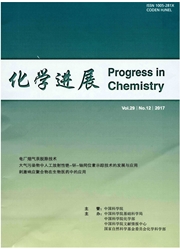

 中文摘要:
中文摘要:
到 nanomaterial 表面的血浆蛋白质的吸附在他们的简历功能上有大影响。然而,有在在蛋白质日冕和材料的生物身份的功能的蛋白质之间的关系的有限理解。这里,我们证明在里面 situ 在 Ca 沸石表面的蛋白质日冕产生了凝血酵素显示一个钙依赖者,不平常地高(3,000 NIH U/mg ) procoagulant 活动,它对 antithrombin 释放是甚至稳定的。移开包含的 Ca < 啜 class= “ a-plus-plus ” > 在沸石的 2+ 由 antithrombin 导致释放。我们的观察建议凝血酵素活动能被无机的表面和阳离子调整。最重要地,我们的发现在蛋白质日冕和材料的 procoagulant 活动显示在 biomolecules 之间的连接,提供为沸石 hemostatics 的 procoagulant 机制的一个新分子的基础。
 英文摘要:
英文摘要:
Adsorption of plasma proteins to nanomaterial surfaces has a great influence on their bio-functionality. However, there is limited understanding of the relationship between the functional proteins in the protein corona and the biological identity of the materials. Here we show that the in situ generated thrombin in the protein corona of a Ca-zeolite surface displays a calcium-dependent, unusually high (-3,000 NIH U/mg) procoagulant activity, which is even stable against antithrombin deactivation. Removing the encapsulated Ca^2+ in the zeolites leads to deactivation by antithrombin. Our observations suggest that the thrombin activity can be regulated by the inorganic surface and cations. Most importantly, our discovery indicates the link between the biomolecules in the protein corona and the procoagulant activity of the materials, providing a new molecular basis for the procoagulant mechanism for zeolite hemostatics.
 同期刊论文项目
同期刊论文项目
 同项目期刊论文
同项目期刊论文
 Low-Temperature, Highly Selective, Gas-Phase Oxidation of Benzyl Alcohol over Mesoporous K-Cu-TiO2 w
Low-Temperature, Highly Selective, Gas-Phase Oxidation of Benzyl Alcohol over Mesoporous K-Cu-TiO2 w Ordered Nanoporous Silica with Periodic 30-60 nm Pores as an Effective Support for Gold Nanoparticle
Ordered Nanoporous Silica with Periodic 30-60 nm Pores as an Effective Support for Gold Nanoparticle Visible-light-driven surface reconstruction of mesoporous TiO(2): toward visible-light absorption an
Visible-light-driven surface reconstruction of mesoporous TiO(2): toward visible-light absorption an Low-Temperature Gas-Phase Oxidation of Benzyl Alcohol on Mesoporous K-Cu-TiO2 through Oxidative Dehy
Low-Temperature Gas-Phase Oxidation of Benzyl Alcohol on Mesoporous K-Cu-TiO2 through Oxidative Dehy TiO2 nanoparticles with increased surface hydroxyl groups and their improved photocatalytic activity
TiO2 nanoparticles with increased surface hydroxyl groups and their improved photocatalytic activity Hydrogenated mesoporous TiO2-SiO2 with increased moderate strong Bronsted acidic sites for Friedel-C
Hydrogenated mesoporous TiO2-SiO2 with increased moderate strong Bronsted acidic sites for Friedel-C 期刊信息
期刊信息
